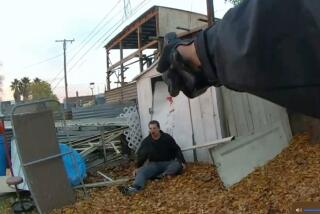San Diego County seeks to overturn record $85-million verdict in civil rights case

- Share via
San Diego County is seeking to overturn a record $85-million jury award in a federal civil rights case involving a man who died in 2015 after a confrontation with sheriff’s deputies.
County lawyers have filed a motion asking U.S. District Court Judge Marilyn Huff to set aside the March 15 verdict in favor of the family of Lucky Phounsy, contending the verdict in the wrongful death lawsuit was “incurably infected with error” and the trial was riddled with rulings that damaged the county’s case.
In a second motion filed earlier this month, the county is seeking a new trial, or a reduction in the monetary award, arguing there were a series of errors at the trial and that the money the jury settled on was excessive.
Phounsy, 32, died after being hogtied, Tasered and restrained by San Diego County sheriff’s deputies at the Santee home of a relative on April 13, 2015. The county medical examiner concluded his death was the result of the long struggle with deputies, combined with the effects of the drug ecstasy he had taken several days before.
But lawyers for the family not only disputed that conclusion but argued that the conduct of the deputies caused him to suffocate to death. They pointed to such actions as binding Phounsy’s hands and ankles in maximum restraints, not monitoring his vital signs after doing so, and continuing to restrain him when one deputy forcibly held his head down while he was in the ambulance.
The case was tried twice in federal court. In September a jury deadlocked and could not reach a verdict. At a second trial held in March, after only a day of deliberation, the jury found the county liable and awarded Phounsy’s family $85 million.
That second trial was different from the first in several ways. Just before trial, lawyers for the family said that the county had acted improperly by not turning over key evidence, including a training video on how to apply restraints that all deputies have to see. They also said results of tests deputies must take after viewing the video to determine how well they understood it were not provided.
Years earlier, at the inception of the case, defense lawyers had asked for all information relating to training on maximum restraints usage. But just before the second trial began they were told by another lawyer in an unrelated case that the training tape existed.
County lawyers also did not turn over results of toxicology tests on Phounsy’s blood that it conducted in between the first and second trials until midway through the second trial. The tests showed that, aside from minimal amounts of ecstasy, there were no other drugs in his system.
The disclosures led U.S. District Court Marilyn Huff to conclude the county had violated its legal obligation — known as discovery — to turn over such materials. Throughout the trial she advised the jurors of these violations, and she said because of them jurors could distrust the county’s version of events on how deputies were trained and on Phounsy’s drug use. Those were two critical elements in the lawsuit.
In motions for a new trial, lawyers for the county said those instructions prejudiced their case. They argued that when Huff told jurors four times about the violations it was excessive and tilted the case against the county.
“The Court elevated the instruction over all others, communicating to the jury that a discovery issue was more important than the burden of proof, the elements of the claims, and all others,” the county argued.
It was one of several errors that the county says Huff made that warrant a new trial. And the county also said that the monetary award of $85 million was excessive when compared with jury awards in comparable cases.
In federal courts judges have the authority to lower the amount of damages given to a plaintiff by a jury, known as remittitur. The plaintiff side can accept the lowered amount, or opt for a new trial on damages.
The county in this instance is seeking for either a new trial or, at the minimum, that Huff reduce the jury award, saying that it was “untethered from reason.”
A chart included in the motion lists 13 other cases of death while in law enforcement custody litigated in federal courts in California and where juries made monetary awards. Three ended with awards greater than $10 million, and the largest of those was $17 million. The county argues the $85 million award was 15 times larger than the average verdict in comparable cases.
Lawyers for Phounsy still have to file their arguments opposing the county motions, which are due May 9. In a statement, attorneys Mark Fleming and Timothy Scott said the county is continuing to evade responsibility for Phounsy’s death.
“The rehashed arguments raised by the County have already been rejected by Judge Huff and the Ninth Circuit Court of Appeals several times,” said Scott in the statement. Fleming said that the bid to cut the money award disrespects “both the value of Lucky’s life and the enormity of his loss to his family, as well as the hard work and careful consideration of the jury.”
Huff has set a date for a hearing on the motions for June 13.
More to Read
Sign up for Essential California
The most important California stories and recommendations in your inbox every morning.
You may occasionally receive promotional content from the Los Angeles Times.














